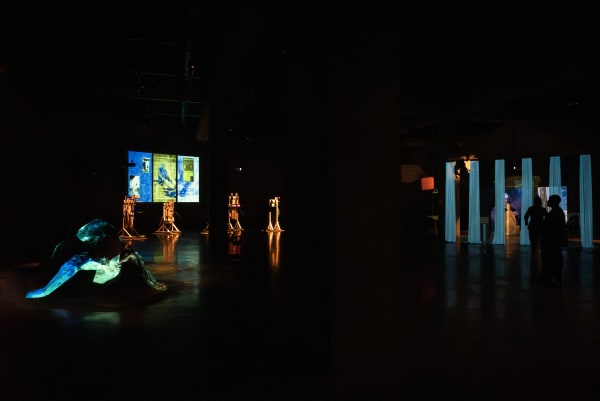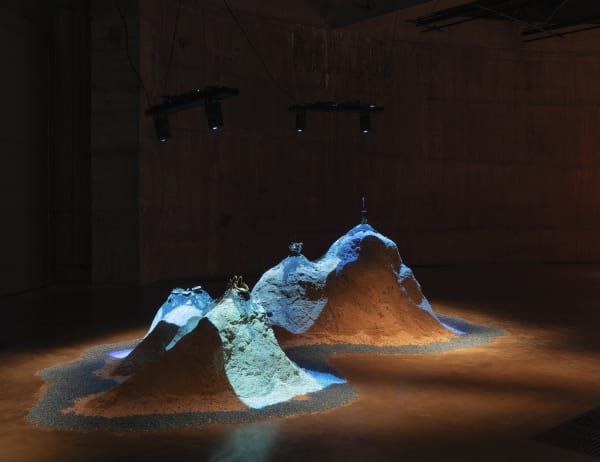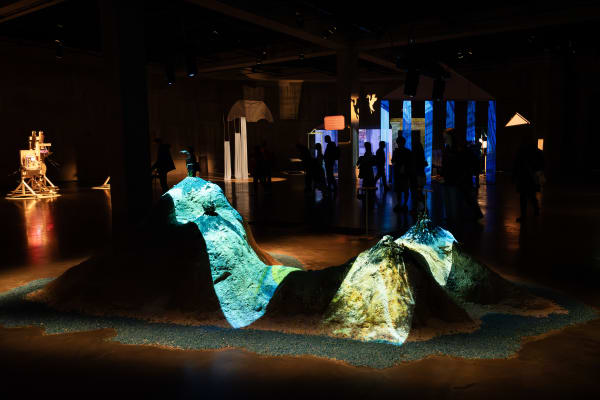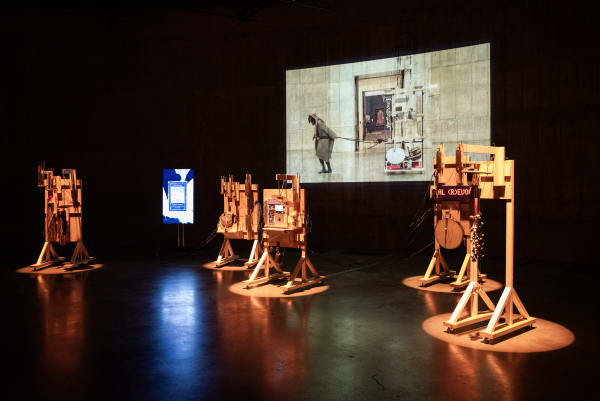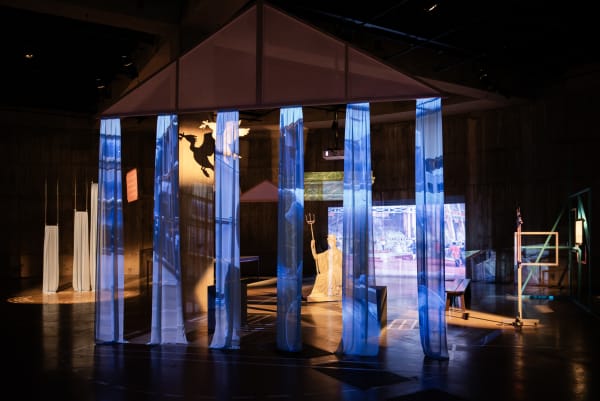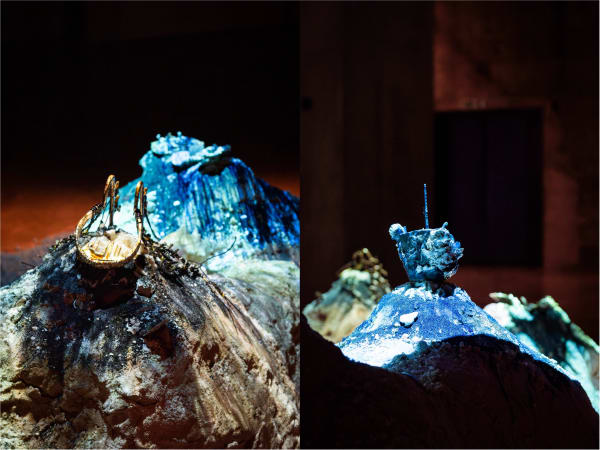Four artists were selected through an open call process to undertake a 15-month practice research residency as part of the Transforming Collections project. Their research engaged with several UK museum collections, bringing experimental creative approaches to the project's questions around what and how museums collect and care, how artists and objects come to be ‘known’ (or ‘forgotten’), and the possibilities for interactive machine learning in sounding out archives, amplifying architectures and re-imagining kinship.
Evan Ifekoya
Ancestor as Muse
Evan Ifekoya is an interdisciplinary artist working in community organising, installation, performance, sound, text and video, whose practice is led by Spirit. They view art as a site where resources can be both redistributed and renegotiated, while challenging the implicit rules and hierarchies of public and social space. Through archival and sonic investigations, they speculate on blackness in abundance. Strategies of space-holding through architectural interventions, ritual, sonic installations and workshops enable them to make a practice of living in order not to turn to despair.
They established the collectively run and QTIBPOC (queer, trans*, intersex, Black and people of colour) led Black Obsidian Sound System (B.O.S.S.) in 2018. They were awarded the Paul Hamlyn Foundation bursary in 2021, the Kleinwort Hambros Emerging Artist Prize in 2019 and the Arts Foundation Award for Live Art sponsored by the Yoma Sasburg Estate in 2017.
Read Evan Ifekoya's artist statement
Ancestor as Muse
Accessing the work of Maud Sulter held in UK national collections presents an incomplete picture. Instead, I look to archives and those inspired by her prolific practice and organising to understand its breadth. My intention is to reimagine a collection as an intimate encounter with Sulter’s practice and her long-standing legacy and impact. Taking the Zabat series as a starting point, I considered how Sulter’s work is framed and taught, and the varying degrees of accuracy of information shared about her online.
This unearthing, making visible, and focusing on the spiritual dimension of Maud Sulter’s work has been an opportunity to reflect upon the years spent with her, drawing on her resources and referencing her texts. Acknowledging and honouring her as an ancestor energises and galvanises my own work. Naming her intentionally in talks and presentations holds space for others to engage with her practice. This project is a distillation of those experiences. The ‘Letter to Maud’ guided journey is, in some way, a non-chronological timeline of some of these events.
My main project outcome is a ‘website as virtual shrine’, An Act of Digital Devotion, where you are invited to immerse yourself in an interactive website, guided on an intimate journey with material related to Maud Sulter. Material is sourced in public collections and websites, interwoven with individual experience and reflections on the impact of her work to younger generation artists. This interactive sonic repository will include a ‘Letters to Maud’ guided journey, a recording of the maud, screening and panel discussion (following the event at Tate Modern), as well as atmospheric textures and field recordings that seek to illuminate and uncover aspects of her practice not widely discussed.
The website will consider viewer experience, interactivity and the role of sound in creating containers. My reflections on the potential of AI and machine learning for re-interpretation of Maud Sulter’s practice will form part of the soundscape and viewing experience through incorporation of adaptive and interactive elements. This allows for adjusting, refining and having agency in your experience, rather than passively consuming content.
Where possible, Maud Sulter is presented in her own words. This project exists to shine a new light on the practice of groundbreaking artist Maud Sulter who sadly passed away in 2008 but leaves a prolific body of work and impact. This Act of Digital Devotion considers the role of sound in creating intimate archives, sacred containers and space for contemplation.
Credits and thanks
Ancestor as Muse
Thank you for all the conversations about Maud that I have had along the way with Oreet Ashery, Lubaina Himid, Ingrid Pollard, Marlene Smith, Dionne Sparks and to Dr Alice Correia for sharing her research.
Artist Research project by Evan Ifekoya
Guided journey narrated by Evan Ifekoya
Web design and development - Guy Ronen
Production assistance - Carlotta Roma
Christina Peake
The Faith, Spirits and Testimonies of Granny Lowe and the Bajan Sea
Christina Peake is a British Bajan collaborative practice-based doctoral researcher with the University of Westminster and The National Archives, whose research practice explores historic narratives of climate colonialism and extractivism in the Caribbean and how these can inform ecological and cultural interventions today. Peake blends research within collections, communities and environments, using immersive methodologies to inform the storytelling of complex speculative worlds, inclusive of their histories and futures.
Read Christina Peake's artist statement
The Faith, Spirits and Testimonies of Granny Lowe and the Bajan Sea
During this practice research residency, I used marine conservation paradigms to develop a Cultural Ecosystem Health Framework (CEHF) to assess the health or degradation of a collection through in-person site visits to research and document engagement with the collection in conjunction with machine learning applications. By establishing where collections may be thriving or degraded through evaluating language (for textual bias), image (visual bias; for example, bias in representation of colonial social hierarchies), institutional reading (how the institution read itself), audience reading (how audiences read/engage the collection), eco-communal origin reading (how the community and/or environment of origin relates to that item), coding (how the institution is visually and experientially coded by others) and absence of material indicating loss and/or damage (what is absent, invisible, silenced or unrepresented).
Machine learning supported the identification of health and degradation by evaluating ecological and racial bias in excerpts from historical and contemporary narratives in archives and collections through a grading system of 1 to -5, where 1 indicates positive health instances/behaviours and -5 indicates negative instances/behaviours of degradation. As we would evaluate the health of a natural ecosystem, we can identify where there is degradation in the biases, absences, silences and the unrepresented that are present in our archives and collections. We can then identify and imagine strategies for regenerative and restorative practices, transforming degraded areas into thriving cultural ecosystems. These areas of degradation and health are then a starting point to create speculative narratives via a process of ‘critical fabulation’ that can form cultural corridors or tidal flows between collections and/or artefacts, bringing visibility to ancestral testimonies and contemporary communities to the fore. This immersive methodology extended to rooting the work within marine environments, specifically the Cornish coast from St Ives to Land’s End, filming and engaging with marine biodiversity such as blue sharks and dolphins, creating marine imaginaries merging the UK and Caribbean.
The work is characterised in speculative creations as symbiotic material artefacts such as Wayfinding Shells – Exodus, ‘the Maroons’ Diadem – Soul Bonded, Divination Bowl – The Last Mangrove, Graeme Hall Sanctuary and Submerged Mothers – Ancestral Reef Regeneration (consisting of projected film on sculpture), animating these works into living entities or abundant knowledge systems that narrate their existence and articulate their being in empathy with the speculative communities, individuals and multiplicity of worlds from which they originate. Each collective or symbiotic work links with another, forming an overarching cultural ecosystem in the installation The Faith, Spirits and Testimonies of Granny Lowe and the Bajan Sea, illustrating the ecologies connecting collections and the inter- and multi-species cosmologies, histories and futures.
In this context, these digital and material creative interventions form an ecology in syncretic collaboration with the collection and learning from the CEHF to inform a ‘tidalectical’ narrative and ‘alter/native’ histography,xi grounded within a Caribbean epistemology and, potentially, as Saidiya Hartman suggests, ‘an act of reparation’.xii At the heart of this installation ecosystem are deep ancestral, ethical and sacred articulations and practices lived through my evolving spiritual syncretism of Caribbean-situated cosmologies.
Credits and thanks
Island fabrication: A. Jones Joinery and Christina Peake
Sculpture development supported by the University of Westminster
In dedication and loving memory of my grandmother Jocelyn Lowe, 1936-2023.
With thanks to Joshua Eyles-Peake, Margaret and William Peake, Thomas J Price, Kwame Boateng and Majdouline Elhichou; Meghan Backhouse, Alex Blakeborough, Marion Servat-Fredericq, Global Cultures Curatorial team, World Museum (Liverpool); Adiva Lawrence, Anna Ruchalska-Pineda and the Curatorial team, Lois South and the Learning and Participation team, International Slavery Museum (Liverpool); William Schupbach and Angela Sawad, Curatorial team, Wellcome Collection; Kaitlene Koranteng, Iniva; Nicola Heald and Moira Lindsay, British Council; Prof. Roshini Kempadoo, Eloise Worrall-Bader, Heidi Kinman, and Katie Woods, University of Westminster; Kevin Searle, The National Archives; Rachael Minott, Wellcome Collection; Adam Jones, Ricky Bunton, Julian Martinez and the team at A. Jones Joinery for their support in the fabrication of the island.
Erika Tan
Ancestral (R)evocations
Erika Tan’s practice has evolved from an interest in received narratives, contested heritage, subjugated voices and the transnational movements of ideas, people and things. Her work arises out of processes of research and responses to the unravelling of facts, fictions and encounters related to events, locations, audiences and specifics that may already exist.
Tan has exhibited internationally including in ESOK Jakarta Biennale (Stovia Museum); Frequencies of Tradition (Times Museum Guangdong); the Diaspora Pavilion (Venice Biennale); Artist and Empire (Tate Touring/National Gallery Singapore); Come Cannibalise Us, Why Don’t You (NUS Museum, Singapore); There is No Road (LABoral, Gijón); Thermocline of Art (ZKM, Karlsruhe); Around the World in Eighty Days (South London Gallery/ICA, London); Belief (2006) and Natasha (2022), Singapore Biennale; Cities on the Move (Hayward Gallery, London); He Xiang Ning Museum, Shenzhen.
Tan leads the MA Fine Art at Central Saint Martin’s, is a Reader of Contemporary Art Practice and a Decolonising Arts Education Fellow with the Decolonising Arts Institute, University of the Arts, London. She is also currently a research member of Circumambulating Objects: On Paradigms of Restitution of Southeast Asian Art (CO-OP), SOAS, London.
Read Erika Tan's artist statement
Ancestral (R)evocations is a series of sonic and visual elements brought together within the format of a presentation or event which ‘sounds’ the archive as a method of evocation, diagnosis and making of kin. This is an act of bringing forth or recalling a feeling, memory or image to mind; an invoking of presence to what might nominally be considered invisible, silent, inert and lacking agency. It is the search for kinship, for lost loves, the summoning of those that have been marooned, bereft of companionship, and to pay homage to those that have gone before us. It is also an act of interrogation, a diagnostic probing into the depths of museal collections, processes and their current states of ‘health and well-being’.
Working within and between the realms of art and medical history, Ancestral (R)evocations gathers and scrapes collections data referencing ‘Southeast Asia’ from British institutions (in this case, Tate and the Wellcome Collection) to bring together forms of computational processes and human–computer collaboration where data, digitised and physical materials, speculation and generative processes, distributed kinship and connections create a series of loosely subjective and firmly indexical sound and image events. Here the potentials and pitfalls of AI and machine learning (ML) in relation to collections data and national collections connects the project to the broader Transforming Collections project of which it is a part, which responds to research questions around bias within museum collections and interpretation. Here the potentials of AI and ML to amplify or continue patterns, or to indeed help identify such patterns within collections data, across multiple collections sites, was an underlying question to return to. The process of cross-institutional data use is fraught with issues of formatting, transparency, access, human labour, processes of redaction and so on, and when that is all overcome and finally the ‘cleaned’ data is with you, the daunting question arises: Whose voice, or what agency, what kind of knowledge is produced, what patterns are highlighted, what exactly is being invoked here, or recalled?
AI and ML are the latest in a lineage of technology that can be put to work on maintaining and extending museal control over objects within collections, but they are also presented as tools that we might use to interrogate these very same spaces. As with all tools, AI and ML inherit cultural and political biases; this practice research project explores how these tools might be used relationally to produce ways we might bring forth agency or presence within the collection data, through sound, sonification, subjectivity, call and response.
Ancestral (R)evocations attests to my interest in exploring the commonalities and dissonances between collections that were developed as a testament to processes related to science and health and those related to art and art histories. Sounding, singing and voicing in the absence of materials is also of interest, and the project uses the gaps in the archives and collections, as well as metaphors of illness and health, absence and presence, representation (Southeast Asian diaspora) and return, revisiting/restitution (Southeast Asian objects).
One of the central protagonists in the work is the ‘Diagnostic Instrument’, built as a prototype capable of sonifying the Southeast Asian collections data through the triggering of sounds made with fragmented elements of my own familial collection of instruments from the region. The other protagonists are the physical buildings of Tate and Wellcome, the structures that house, hold and keep institutional histories, objects, peoples, processes and stories – and that sonically become the location of reverberations generated through the process of the Diagnostic Instrument’s visitations to these sites. Alongside these, data and structure are also protagonists. Here the work of Kim Lim (Sphinx, 1959, T15938), David Medalla (Sand Machine Bahag – Hari Trance #1,1963–2015, T15371) and Vong Phaophanit (Neon Rice Field, 1993, T14130) all in the Tate collection and on display during the filming of Sounding the Archives (title tbc), are talismanic touchstones for the artist and performer Noel Ed De Leon, filmmaker and artist Chanthila Phaophanit, and myself, as the artist and practice researcher, who also appear in the video element of Ancestral (R)evocations.
Credits and thanks
Video work
Direction & Editing: Erika Tan
Camera and Sound: Chanthila Phaophanit, Cuan Roche, Turab Shah
Performers: Noel Ed De Leon, Chanthila Phaophanit, Erika Tan
Filming Support: Ariel Haviland (Tate), William Schubach, Orla O’Donnell and Julia Nurse (Wellcome Collection)
Diagnostic Instruments and live binary sematic ML sounds (Museum Feedback & Ancestral (R)evocations)
Technical Production & Installation, Software Development, Machine Learning (sound design): Daniel Hearn
Design Engineer (instruments): Daniele Di Paolo
Sound Design (Museum Feedback & Ancestral (R)evocations): Garin Curtis & Daniel Manz
Software Development: Luke Plowden
Creative Technologist: Hannah Petter
Installation Technician: Rosie Walker
LED signage text: Text selection and edit, Erika Tan; Text sourced from Tate and Wellcome Collection artefact descriptions.
With thanks to collaborators, creative technologists, artists, supporters: who have helped make this work possible: Daniel Hearn, Daniele Di Paolo, Garin Curtis & Daniel Manz, Luke Plowden, Hannah Petter, Rosie Walker, Polo Sologub, George Meadows, Lexin Zhou, Vong Phaophanit, Claire Oboussier, Chanthila Phaophanit, Cuan Roche, Turab Shah, Noel Ed De Leon, Adam Nankervis, Daniel Kupferberg, Anthony Lam, Nathaniel Tan Lam and the staff teams of Wellcome Collection, Tate, Creative Computing Institute and Decolonising Arts Institution.
Yu-Chen Wang
How We Are Where We Are
London-based Taiwanese-British artist Yu-Chen Wang’s work asks fundamental questions about human identity at a key point in history when ecosystems and technosystems have become inextricably intertwined. She has a long-standing interest in the entangled relationship between land, history and identity. Many of her projects have been developed through undertaking residencies, conducting field research, developing cross-cultural and disciplinary collaborations, creating site-responsive exhibitions, and engaging with the public. All of these are vital processes for developing her artistic practice: mapping, navigating and connecting.
Her work is informed by the history of places, collective memories, individuals’ stories and relationships established with different localities and communities: from Manchester’s textile and railway industries, Birmingham’s canal networks, Liverpool’s observation and maritime navigation, CERN’s particle physics research, South Yorkshire’s peat extraction and coal mining, to East Anglia’s agriculture and ongoing peatland conservation and, most recently, Taiwan’s mangrove forests.
Wang has exhibited widely, including most recently at the Drawing Biennial (London, 2024), Le lieu unique (Nantes, 2022), MoCA Taipei (2020), Kumu Art Museum, (Tallinn, 2020), and Science Gallery Dublin (2020).
Read Yu-Chen Wang's artist statement
How We Are Where We Are
Expanding further upon my long-term interest in industrial history and its inextricable link with British identity, I am exploring collections from the Walker Art Gallery in Liverpool, Manchester Art Gallery, Birmingham Museum and Art Gallery, and Tate Britain. As part of the Transforming Collections practice research residency, I began the project by tracing the histories of art museums in the most important industrial cities of nineteenth-century Britain: Liverpool, Manchester, Birmingham and London. This period was marked by immense industrial development, economic progress and imperial expansion, which fundamentally transformed the nation and continues to have a lasting impact on contemporary life today.
I am interested in the social relations and power dynamics that shaped these museums – a mix of public and private, civic and individual – driven by Victorian ideas about the role of art in reforming society. These museums were created as models for improving industrial design and working-class behaviour, with the pursuit of beauty intended ‘to rectify the moral and physical ugliness of industrial capitalism’1. I have been investigating the entangled relationship between art and industry, and their often-overlooked connection with empire. Specifically, I am focusing on how these entanglements manifest in museum spaces.
These spaces, encompassing both physical architecture and intangible systems of collecting and interpreting, have been carefully and deliberately constructed to tell stories and direct specific perspectives. My project aims to shed light not just on what we see, but also how we perceive museum collections and narratives. This new work asks how we navigate in and around these spaces as a way to begin addressing decolonial practices. It also examines how we recognise celebrations of white superiority and naturalising Western imperialism that are still deeply embedded in our museums today.
Working closely with the curators from these museums and Creative Computing Institute data scientists, I am creating a machine learning dataset using photographs of collections I have taken during the residency. Unlike typical images found in museum databases, these pictures capture collection items in context, in relation to other objects, the surrounding gallery settings and architectural space. The approach, coupled with textual analysis and data labelling based on my personal experience of seeing and navigating, aims to unravel layers of constructs shaping museum spaces and narratives. This image-focused dataset will offer a great opportunity to test the potential of training algorithms to identify language patterns and visual representations that have long privileged whiteness and that continue to perpetuate colonial perspectives and exclusionary practices.
I am creating an architectural and theatrical intervention within Tate Modern’s South Tanks. Resembling theatre sets, this installation combines suspended wooden structures, painted fabric backdrops, floor drawings, sculptural props, lighting, sounds and multilayered projections to spatially evoke speculative museum environments. Audiences are encouraged to become more attuned to various embedded visual tropes, consider how they interact with the work and navigate spaces. The audiences’ movements and experiences, both individually and collectively, will help to activate multiple perspectives and contribute to the completion of the installation. The work at Tate Modern will serve as a blueprint for a series of evolving exhibitions at the Walker Art Gallery, Manchester Art Gallery and Birmingham Museum and Art Gallery in 2025 and beyond.
Credits and thanks
How We Are Where We Are
In collaboration with
Installation: Andro Semeiko
Camera: Chris Keenan
Sound: Capitol K
With thanks to Kate Jesson, Natasha Howes from Manchester Art Gallery
Victoria Osborne, Jo-Ann Curtis from Birmingham Museums
Nicola Selsby-Cunningham, Laurence Westgaph, Fiona Slattery Clark, Adiva Lawrence, Madelyn Walsh from Liverpool Museums
Prof. Kate Nichols from University of Birmingham
Prof. Sadiah Qureshi from University of Manchester
National Cultural and Arts Foundation, Taiwan
